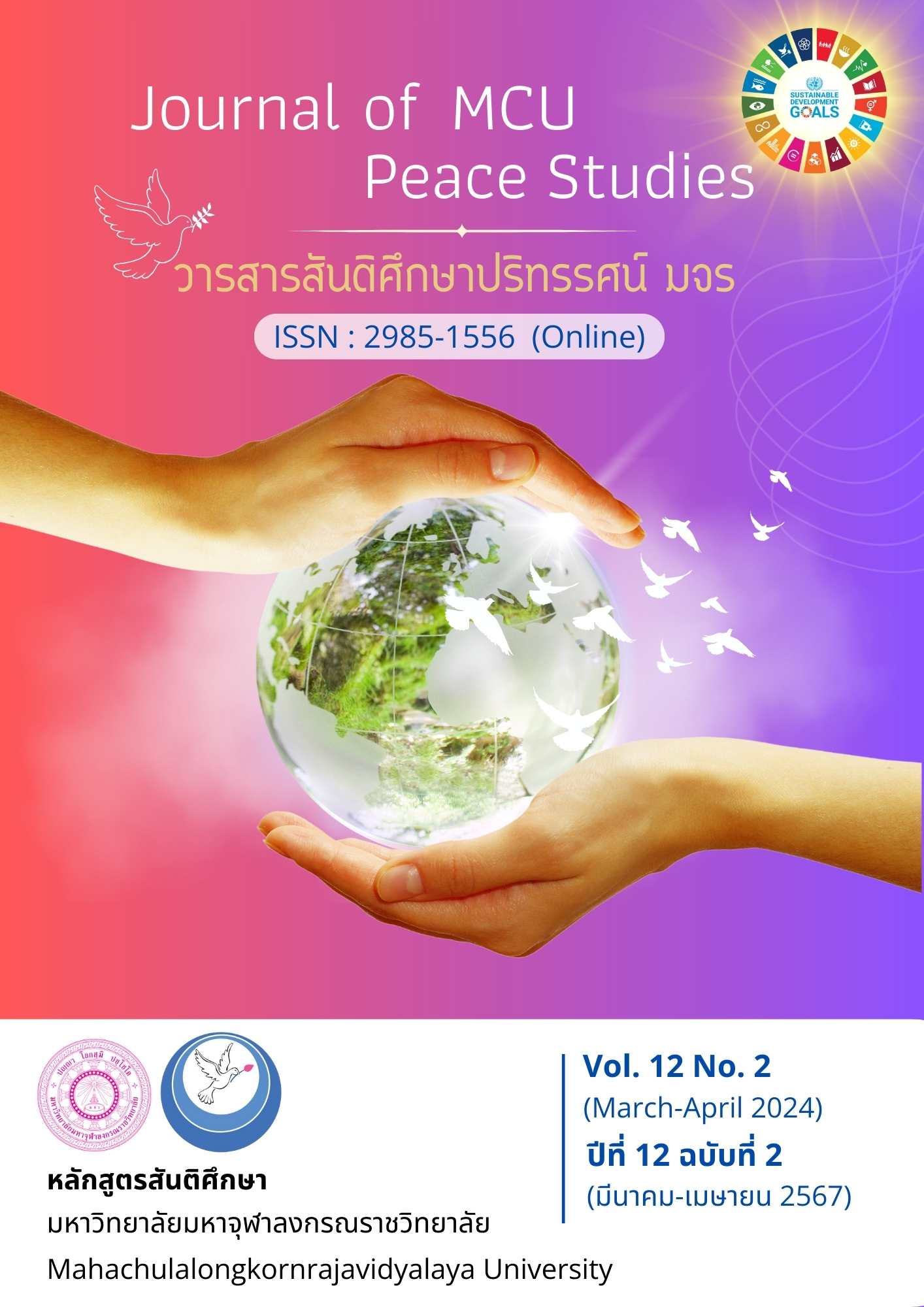รูปแบบการพัฒนาสมรรถนะความเป็นผู้ประกอบการของนักศึกษาในสถานศึกษา สังกัดสำนักงานคณะกรรมการการอาชีวศึกษา
Main Article Content
บทคัดย่อ
การวิจัยครั้งนี้มีวัตถุประสงค์เพื่อ 1. ศึกษากระบวนการพัฒนา วิธีการพัฒนาและสมรรถนะความเป็นผู้ประกอบการของนักศึกษาในสถานศึกษาสังกัดสำนักงานคณะกรรมการการอาชีวศึกษา 2. สร้างรูปแบบการพัฒนาสมรรถนะความเป็นผู้ประกอบการของนักศึกษาในสถานศึกษาสังกัดสำนักงานคณะกรรมการการอาชีวศึกษาและ 3. ประเมินรูปแบบการพัฒนาสมรรถนะความเป็นผู้ประกอบการของนักศึกษาในสถานศึกษาสังกัดสำนักงานคณะกรรมการการอาชีวศึกษาโดยแบ่งการดำเนินการวิจัยออกเป็น 3 ขั้นตอน ดังนี้ ขั้นตอนที่ 1 การศึกษากระบวนการพัฒนา วิธีการพัฒนา และสมรรถนะความเป็นผู้ประกอบการของนักศึกษาในสถานศึกษาโดยการศึกษาเอกสารและงานวิจัยที่เกี่ยวข้อง โดยการสัมภาษณ์ผู้ทรงคุณวุฒิ จำนวน 6 คน และสถานศึกษาที่มีการปฏิบัติที่ดี จำนวน 3 แห่ง ขั้นตอนที่ 2 การสร้างรูปแบบการพัฒนาสมรรถนะความเป็นผู้ประกอบการของนักศึกษาในสถานศึกษาโดยการตรวจสอบความเหมาะสม จากผู้ทรงคุณวุฒิ จำนวน 9 คน โดยใช้แบบสัมภาษณ์ และขั้นตอนที่ 3 การประเมินความเป็นไปได้และ ความเป็นประโยชน์ของรูปแบบการพัฒนาสมรรถนะความเป็นผู้ประกอบการของนักศึกษาในสถานศึกษา โดยการตอบแบบสอบถามจากผู้อำนวยการ รองผู้อำนวยการ ครูที่ปรึกษาศูนย์บ่มเพาะผู้ประกอบการอาชีวศึกษา สังกัดสำนักงานคณะกรรมการการอาชีวศึกษาในเขตภาคเหนือจำนวน 108 คน เครื่องมือที่ใช้ในการเก็บข้อมูล ได้แก่ แบบสอบถามการประเมินความเป็นไปได้และความเป็นประโยชน์ของรูปแบบการพัฒนาสมรรถนะ ความเป็นผู้ประกอบการของนักศึกษาในสถานศึกษาซึ่งมีลักษณะเป็นแบบมาตราส่วนประมาณค่า (Rating Scale) 5 ระดับ
ผลการวิจัยพบว่า 1. กระบวนการพัฒนาสมรรถนะความเป็นผู้ประกอบการของนักศึกษาในสถานศึกษา สังกัดสำนักงานคณะกรรมการการอาชีวศึกษา มี 4 ประการ ได้แก่ 1) การสำรวจความต้องการการพัฒนาสมรรถนะ 2) การวางแผน และออกแบบการพัฒนาสมรรถนะความเป็นผู้ประกอบการของนักศึกษา 3) การดำเนินการพัฒนาสมรรถนะความเป็นผู้ประกอบการของนักศึกษา 4) การประเมินผลการพัฒนาสมรรถนะความเป็นผู้ประกอบการของนักศึกษา, วิธีการพัฒนาสมรรถนะ มี 3 วิธี ได้แก่ การจัดสถานการณ์จำลอง การฝึกอบรม และการศึกษาดูงาน และสมรรถนะความเป็นผู้ประกอบการ มี 3 ด้าน ได้แก่ ด้านความรู้ ด้านทักษะ และด้านคุณลักษณะ 2. รูปแบบการพัฒนาสมรรถนะความเป็นผู้ประกอบการของนักศึกษาในสถานศึกษาสังกัดสำนักงานคณะกรรมการการอาชีวศึกษา ประกอบไปด้วย 4 องค์ประกอบ ได้แก่ องค์ประกอบที่ 1 ผู้ดำเนินการพัฒนา องค์ประกอบที่ 2 กระบวนการพัฒนาสมรรถนะความเป็นผู้ประกอบการของนักศึกษาองค์ประกอบที่ 3 วิธีการพัฒนาสมรรถนะความเป็นผู้ประกอบการของนักศึกษา องค์ประกอบที่ 4 สมรรถนะความเป็นผู้ประกอบการของนักศึกษา 3. ผลการประเมินรูปแบบความเป็นไปได้และความเป็นประโยชน์พบว่ารูปแบบมีความเป็นไปได้อยู่ในระดับมาก และความเป็นประโยชน์ก็อยู่ในระดับมาก
Article Details

อนุญาตภายใต้เงื่อนไข Creative Commons Attribution-NonCommercial-NoDerivatives 4.0 International License.
ทัศนะและความคิดเห็นที่ปรากฏในบทความในวารสาร ถือเป็นความรับผิดชอบของผู้เขียนบทความนั้น และไม่ถือเป็นทัศนะและความรับผิดชอบของกองบรรณาธิการ ยินยอมว่าบทความเป็นลิขสิทธิ์ของวารสาร
เอกสารอ้างอิง
Chinweroj, J. (2019). Development of Steering System for Entrepreneurship Incubator at Vocational Level. Vocational Education Innovation and Research Journal, 3(2), 40-46.
Choocherd, S. (2022). The Development of Personnel Competency in Working More Efficiency. Valaya Alongkorn Review (Humanities and Social Science, 12(1), 223-238.
Ernest, K., Matthew, S. K., & Samuel, A. K. (2015). Towards Entrepreneurial Learning Competencies: The Perspective of Built Environment Students. Higher Education Studies, 5(1), 20-30.
Ferreras-Garcia, R., Sales-Zaguirre, J. & Serradell-López, E. (2021). Developing Entrepreneurial Competencies in Higher Education: A Structural Model Approach. Education + Training Emerald Publishing Limited, 63(5), 1-24.
Ketkaew, K., & Srimai, S. (2019). Business Model and Its Implementation. Modern Management Journal, 17(1), 1-12.
Khongmalai, B., & Arreesophonphichet, S. (2015). The Development of Knowledge Management competencies for Higher Education Students in the 21st Century. Journal of Education Studies, Chulalongkorn University, 43(1), 37-47.
Kuratko, D. F. (2011). Entrepreneurship Theory, Process, and Practice in the 21st Century. International Journal of Entrepreneurship and Small Business, Inderscience Enterprises Ltd, 13(1), 8-17.
Office of Small and Medium Enterprise Promotion. (2022). Action Plan of the Office of Small and Medium Enterprise Promotion for the Year 2022. Retrieved December 12, 2022, from https://www.sme.go.th/upload/mod_download/download-20220421150627.pdf
Office of Student Affair, Chulalongkorn University. (2020). 6 Skills. Retrieved October 10, 2022, from https://www.sa.chula.ac.th/6-skills/
Phamornprawat, S. (2017). Organization of Teaching Systems and Basic Knowledge about Teaching. Bangkok: Office of Human Resources Management, Royal Irrigation Department.
Phungphol, W., & Jadesadalug, V. (2018). New Entrepreneurial Characteristics Affecting Business Performance through the Competitive Advantage of the Start-up Business. Dusit Thani College Journal, 12(2), 303-318.
Pommi, Ch., & Naksai, S. (2020). Factors Influencing Entrepreneurial Intentions of Students in the Entrepreneurship Focused Programs at the University of Phayao. Journal of Business Administration and Social Sciences Ramkhamhaeng University, 3(3), 65-80.
Poolsawat, P. (2019). Factors Influencing New Entrepreneurship: A Case Study of Business Administration Students in the South of Thailand. (Doctoral Dissertation). Prince of Songkla University. Songkla.
Praphasanobol, V., & Vanichwatanavorachai, S. (2023). A Model for Developing Pro-service Teachers’ Teaching Competencies by Using Project-based and Creative Learning Management to Enhance Students’ Creative Innovation Ability. Journal of Education, Prince of Songkla University, Pattani Campus, 34(1), 144-161.
Prasertsin, U., Srihaset, K., & Laonoi, A. (2021). Guidelines for Competency-based Assessment in 21st Century. Journal of Educational Measurement, Mahasarakham University, 27(2), 16-31.
Praspan, J., & Wattananarong, K. (2021). Development of Traits and Behaviors of Startup Entrepreneurs. Journal of Social Science and Buddhistic Anthropology, 6(1), 181-198.
Ragauskaitė, A., & Zaleckienė, J. (2018). Innovative Methods and Approaches towards the Development of the Students’ Entrepreneurial Competencies. Research for Rural Development, 2, 258-266.
Siripiyanon, S., & Wangsrikoon, A. (2022). The Implementation on Development of the Teachers for the Characteristics in the 21st Century of the Academic Administrators under the Office of Phichit Secondary Educational Service Area. Journal of Modern Learning Development, 7(6), 269-279.
Sisaat, B. (2017). Basic Research. (10th ed.). Bangkok: Suweeriyasarn.
Srinakharinwirot University. (2017). A Guide to Evaluating Performance Work. Bangkok: Srinakharinwirot University.
Sudsanguan, O. Y. et al. (2021). The Development of Training Courses to Enhance the New Entrepreneur in Vocational Business Incubator One Stop Service Center. Interdisciplinary Sripatum Chonburi Journal, 7(2), 113-128.
Supasaktumrong, Ch. (2018). The Roles of Management in Human Resource Development. Veridian E-Journal, Silpakorn University, 11(2), 1702-1713.
Thongsima, A. (2018). Establishing Standards for Personnel Development within the Organization. Journal of Modern Learning Development, 3(1), 1-16.
Thurapan, K. et al. (2015). The Development Rajabhat University Student Leaders’ Core Competency in the Upper-region of Northeastern Thailand. Research and Development Journal Loei Rajabhat University, 10(32), 13-22.
Torrejos, M. D. et al. (2020). A Case Study on HRM Practices of Library Managers. Solid State Technology, 63(6), 16186-16196.


